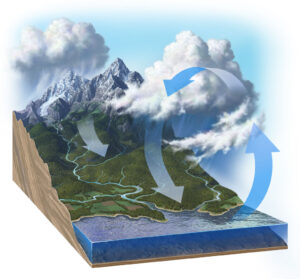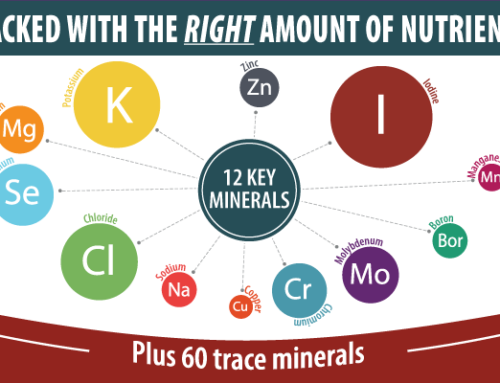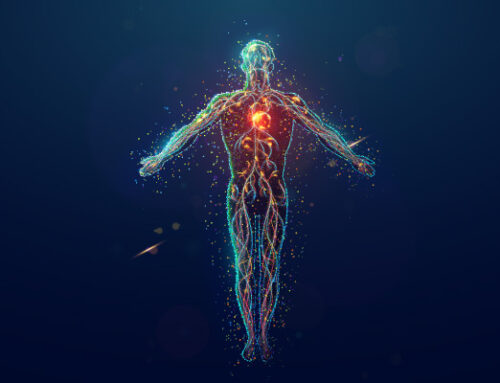Unless you’re a health expert you might not know much about the mineral content of the foods you eat or the effects of a trace minerals deficiency. After all, if you were to ask a server how much copper you would be getting from a meal, you would probably get a bewildered stare. Just because trace minerals are only needed in small quantities, doesn’t mean they aren’t critical for health. Here we have compiled 9 facts to know.
1. The body cannot produce trace minerals.
Trace minerals are essential nutrients just like the macro minerals (think: calcium and magnesium), and the body cannot produce them by itself. They have to come from food or drink, ideally water. Being essential also means that a trace mineral deficiency will cause health problems. On the flip side, if we correct the deficiency, health problems can often be reversed.
Related article: Trace Elements in elete Electrolyte Add-In
2. Food only contains trace minerals if trace minerals are present in the soil.
Here is some bad news, even if you think you are eating well: Food cannot contain minerals that have been depleted from the soil. While healthy eating is a good start, the problem is that our soils have become depleted through modern farming practices that focus on production rather than nutrition. We have all heard that we get what we pay for. Farmers get paid on kilos and bushels they produce but not on how mineral-rich their vegetables are. NPK fertilizer is the most common fertilizer but it replaces only three basic minerals: nitrogen, phosphorus, and potassium. These macro minerals dramatically increase harvest yields but the world has seen a steady and dramatic decrease in the nutritional value of the foods we eat over the last 40 years.
Processing, such as peeling, extracting, heat-treating, and early harvest for storage and transportation, further diminishes the nutrients in foods. We are often unaware of these deficiencies since you cannot go into a grocery store and see how much chromium there is in the broccoli or the iron content in a bunch of spinach. (See sources below.)
Related article: Minerals and Immune Function
3. The earth’s water cycle washes minerals from the soil.

The Earth’s Water Cycle
The water cycle starts with pure water falling in the form of rain and snow. Pure water is the universal solvent and is hungry to pick up minerals from mountains, rocks, and soil. Plants pick up minerals from the soil and as they decay, they release minerals into the water. In addition, as vegetables are cultivated and harvested, they take the minerals they have absorbed from the soil. Thus minerals are continually being depleted from the soil.
4. Good news: Trace minerals end up in the seas.

As the soils have become depleted the oceans have become enriched
Now it’s time for some good news: As the soil is depleted, the seas become enriched. As water evaporates from the seas, it evaporates as pure water and leaves the minerals behind. One amazing repository of minerals is the Great Salt Lake in Utah. The Great Salt Lake receives water and minerals from the Uinta, Wasatch, and Sawtooth mountains, the entire Great Basin area, and has no outlet. As the water evaporates, it leaves the minerals behind. This inland sea is between six to ten times more concentrated than seawater.
Related article: Mineral Resources International – 50 Years of Improving Global Health
5. Fun fact: The body’s fluids mirror the Earth’s.
The Earth’s major fluids and the body’s major fluids are very similar in mineral balance. Dr. Forrest Nielson with the USDA explained that the more likely one was to find a mineral in seawater, the more likely that the mineral would be safe and essential for human health. Life has always been closely associated with the seas. Water only flows downhill and carries with it vital nutrients. Although the world’s soils have become depleted, the seas are a nearly perfect source of minerals and trace minerals. Worried about trace mineral deficiency?
The oceans and the Great Salt Lake have been called a smorgasbord for minerals trace minerals.
6. Worries about trace mineral deficiency? Consider this ancient wisdom…

Humans have done a good job multiplying but not replenishing
Ever think about how in the Bible the Lord commanded Adam and Eve to multiply and replenish the Earth? Humans have now done a pretty good job of multiplying, but have done a poor job of replenishing the Earth. One consequence of careless stewardship of the Earth is disease, some caused by trace mineral deficiencies.
Related article: Magnesium Deficiency – Needs for Magnesium not met in most people
7. Trace minerals serve many functions.
Trace minerals are power houses. Some act as antioxidants, such as copper, selenium, manganese, and zinc, protecting the body from long-term damage. They’re also responsible for supporting your blood system and are necessary for the healthy growth of certain hormones. Trace minerals also ensure the proper development of neurological functions and enzymes throughout the body.
8. Many trace minerals are recognized as essential by the FDA:
Here are the trace elements considered essential by the United States Food and Drug Administration:
- Iron: Beneficial for the formation of red blood cells and muscle growth. It can be found in red meat, poultry, fish and seafood, and dark, leafy veggies.
- Chromium: Helps control glucose levels and metabolic functions. A well-balanced diet with the proper amount of vegetables, fruits, meats, poultry, and grains will ensure your body has the necessary amount of chromium.
- Copper: Part of many of your body’s enzymes that control energy production, metabolism, and the making of hemoglobin. It can be found in organ meats, shellfish, whole-grain cereals, nuts, and seeds.
- Iodine: An important part of thyroid hormones, iodine can help with weight control, mental development, and brain growth. It’s most often found in eggs, poultry, grains, and dairy products.
- Manganese: Helps with carbohydrate, protein and cholesterol metabolism, cartilage and bone formation, wound healing.
- Molybdenum: Is an essential part of Enzyme production.
- Phosphorus: Acid-base balance, bone formation, energy production and storage, hormone activation.
- Selenium: An essential antioxidant that aids with, immune function, reproduction, thyroid function.
And as a bonus, here are two additional trace elements that have not yet been designated by the FDA as essential, but are contenders for the list. As context, when Mineral Resources International started in business in 1969, Zinc was not yet considered essential.
Top contenders for addition to the list:
- Boron: Important for healthy bone health, brain function, and immune response.
- Lithium: Considered a calming mineral and important for mental health.
9. Common Trace Mineral Deficiency Symptoms
If our body isn’t getting an essential nutrient, we’re going to notice it. Some of the most obvious trace mineral deficiency symptoms are anemia, fatigue, or irregular heartbeat. Poor digestion and appetite, as well as chronic fatigue and brain fog, could also be signs that your body lacks trace minerals, such as iodine. Paying closer attention to what you eat and supplementing your diet with trace mineral drops from a natural source, such as the Great Salt Lake, is one of the best ways to see a quick improvement.
For over fifty years, family-owned and operated Mineral Resources International has been helping people all over the world obtain the necessary minerals to live a healthy life. Contact us today or shop online for concentrated mineral drops and other high-quality supplements. Read more about our history here.
Sources:
- Dr. David Thomas researched and documented the steady decline of minerals in foods in the United Kingdom. Citation: Thomas D. The Mineral Depletion of Foods Available to Us as a Nation (1940–2002). Nutrition and Health, 2007, Vol. 19: 21–55.)
- Paul Bergner, author, researched and documented the steady decline of minerals in foods, based on USDA data. Bergner P. The Healing Power of Minerals and Trace Elements. Publ: Prima Publishing, Inc., 1997.






